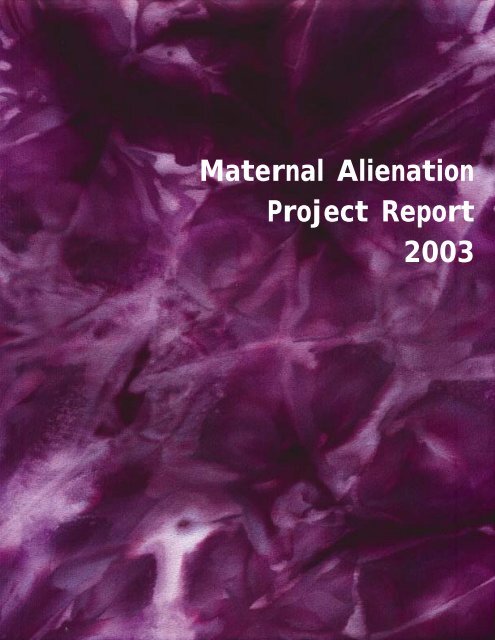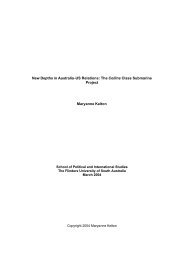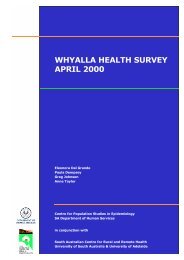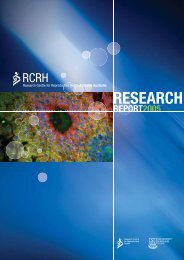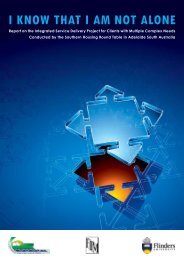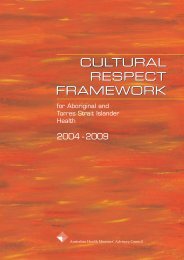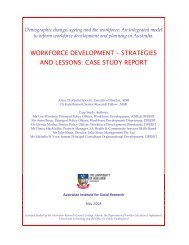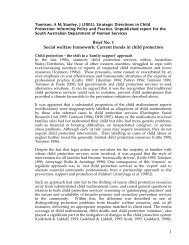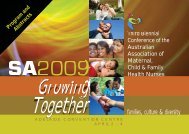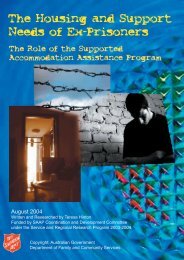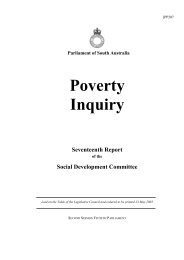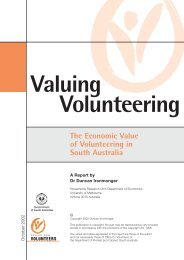Maternal Alienation - South Australian Policy Online
Maternal Alienation - South Australian Policy Online
Maternal Alienation - South Australian Policy Online
- No tags were found...
You also want an ePaper? Increase the reach of your titles
YUMPU automatically turns print PDFs into web optimized ePapers that Google loves.
<strong>Maternal</strong> <strong>Alienation</strong>Project Report2003
<strong>Maternal</strong> <strong>Alienation</strong> ProjectPROJECT REPORTAnne Morris<strong>Maternal</strong> <strong>Alienation</strong> ProjectNorthern Metropolitan Community Health ServiceWomen’s Health StatewideUniversity of AdelaideJuly 2003
CONTENTS1. Background ……………………………………….. 32. Project Design ………………………………………. 41. Practice ……………. 42. Systems Change ……………. 63. Research ……………. 103. Project Aims & Objectives ………………………….. 124. Project Outcomes ………………………………………. 155. Opportunities for Future Work ………………………….. 226. Recommendations ……………………………………… 25Appendix I - Reference Group Terms of Reference … 26Appendix II - Advisory Group Terms of Reference … 27Appendix III – Diagram of Project Design …… 28Appendix IX – Mapping of Project’s areas of influence .. 292
<strong>Maternal</strong> <strong>Alienation</strong> ProjectPROJECT REPORT1. BACKGROUNDThe <strong>Maternal</strong> <strong>Alienation</strong> Project began in August 2002 as a partnershipinitiative between Northern Metropolitan Community Health Service,Women’s Health Statewide and the University of Adelaide. The projectinitially employed a Project Officer at 0.6 FTE from funds made availableby Women's Health Statewide. From February 2003 NorthernMetropolitan Community Health Service funded the project at 0.6FTEfrom its core funds.The project was originally designed as a three-year project with a fulltimeworker, but as sufficient funds could not be secured for this lengthof time, the project’s long-term goals could not be realised. However,significant outcomes were achieved during the eleven months of theproject.The project built on findings from an action research project atNorthern Women’s (Northern Metropolitan Community Health Service) inpartnership with the University of Adelaide in 1999, in which ‘maternalalienation’ was first identified and named as a significant component ofviolence. <strong>Maternal</strong> alienation was found to occur across a spectrum ofviolence, including domestic violence and child sexual abuse. It is a termfor the range of tactics used by men to deliberately undermine anddestroy the relationship between mothers and their children, as well asthe profound and often lasting alienation created in the relationshipsbetween mothers and their children by the use of those strategies.3
2. PROJECT DESIGNThe project used a 3-fold design to optimise the interactions betweenthe areas of Practice, Systems Change and <strong>Policy</strong>-Making, and Theory andResearch (See Appendix III for Diagram of Project Design).1. PracticePractice modelsTwo working groups were formed to develop service responses to addressmaternal alienation and its effects.1. Group One consisted of counsellors from women's health services.They developed understandings and tools to address the effects ofmaternal alienation on adult survivors of child sexual abuse.2. Group Two consisted of workers from Northern and CentralViolence Intervention Programs. They developed principles andtools for working with mothers and children who have beenalienated from one another while subject to violence.An Advisory Group made up of practitioners from a wide range ofgovernment and non-government agencies met several times with theproject officer and the 2 working groups to reflect on and contribute tothe progress of this work.Resources1. A Fact Sheet on <strong>Maternal</strong> <strong>Alienation</strong> for workers and communitymembers was produced and circulated, and is available from thewebsite of Women's Health Statewide and the <strong>Australian</strong> Domesticand Family Violence Clearinghouse.2. A Resource for Practitioners who deal with issues of violenceagainst women and children and issues for survivors of child sexualabuse was produced and circulated.4
3. A Training Video demonstrating counselling approaches for workingwith mothers and children subject to maternal alienation has beenproduced.Professional trainingProfessional training was undertaken with practitioners from manyagencies. This was seen as an important part of the project’s work, asthe research project in 1999 revealed that service providers did notunderstand maternal alienation and tended to exacerbate the problemsassociated with it. An initial Forum was held at which over 60 workersfrom government and non-government agencies, metropolitan and rural,attended. Further presentations, forums and workshops were undertakenwith:• Workers from Family and Youth Services• Mediators and Counsellors at the Family Court (Adelaide Registry)• Officers from Children and Family Investigation Units (SA Police)• Workers from Western Domestic Violence Service• Western Domestic Violence Action Group• NW Children and Families Integration Program• Reverberations Forum (interagency forum in Adelaide's western area)• Government and non-government workers in the south of Adelaide.• Northern Human Services Managers ForumFurther strategiesIn addition the project undertook:• Submission to the Family Violence Committee of the Family Court• Meeting with the Magistrate of Adelaide's Domestic Violence Court5
• Training the trainers of Education Centre Against Violence, Sydney.As a result ECAV has included maternal alienation in its training ofpractitioners in NSW.• Initiating discussions with VIP and the Director of Cedar Cottage(pre-trial diversion program for child sex offenders, NSW), toorganise a workshop to examine how understandings from programswith child sex offenders can be transferred to programs for domesticviolence perpetrators.2. Systems ChangeIntersectoral relationshipsWhile situated in Community and Women's Health, The <strong>Maternal</strong><strong>Alienation</strong> Project worked across sectors, forming particular connectionswith Family and Youth Services, domestic violence services, nongovernmentorganisations, Attorney-General's Department, <strong>South</strong><strong>Australian</strong> Police, Child and Adolescent Mental Health Service, the FamilyCourt of Australia, and the Office for the Status of Women (SeeAppendix IV for Mapping of Project’s Areas of Influence). Theserelationships were consolidated by the participation of many of theseorganisations within the project's Reference Group. One role of theReference Group was to assist the project to achieve its outcomesparticularly in the area of systems change.Early Intervention and PreventionThe <strong>Maternal</strong> <strong>Alienation</strong> Project represents an important initiative in anearly intervention/prevention approach. The following Table indicates howappropriate responses to maternal alienation are also earlyintervention/prevention responses.6
Table 1: How integrating awareness of maternal alienation would changeresponses and outcomesPROBLEMMother and child alienated bystrategies of perpetrator ofviolenceChildren unable to accesstheir mother as mainsupporter due to maternalalienation.Demeaning and disrespectfulattitudes to women are taughtwithin families.Children coached to commitacts of abuse and disrespectto their mothers.Inappropriate responses byagencies which blame womenand further damage familyrelationshipsGaps in knowledge of DVperpetrators' deliberate useof strategies to manipulate,punish and control.Lack of knowledge of maternalalienation in Family Court.Lack of knowledge in criminaljustice system of DVperpetrators' deliberate useof strategies to manipulate,punish and controlCHANGES TO SERVICERESPONSESupport mothers and children tounderstand this and then build anew alliance, to re-form as afamilyModels of Practice that enhancemothers' support of theirchildren, and allow children toaccess their mothers as the mainagents of their own protectionWork with children, young peopleand women on genderstereotypes, especially how theyconstruct mothersExplicit work with children andyoung people, possibly using anadaptation of the Power andControl wheel, facilitation ofdiscussions between women andchildren.Professional training acrossservices and sectors providingnew models and toolsEnhanced perpetrator programswhich explicitly address wayschildren are abused, manipulatedand alienated from theirmothers.Training for Family Courtofficials.Training for professionals incriminal justice systemEARLY INTERVENTION,PREVENTION OUTCOMEPrevention of family breakdownand youth homelessness inaftermath of violenceDecreased need for statutorybodies to be involved inprotecting children.Decreased need for otherservices to be involved in thefuture (mental health, drug &alcohol, criminal justice, etc)More positive communityattitudes to women, morerealistic perceptions ofmothers/motherhood, betterfuture relationships.Decreases in adolescent violenceto mothers.Decreases in violence againstwomen in future relationships.Decreases in abuse of elderlywomen by adult children.Increased safety and well-beingfor women and childrenDecreased family breakdownpost separationDecreased reception of childreninto careIncreased effectiveness ofprogramsDecrease in children being usedin custody disputes, and/or as aroute to tracing/controlling thewoman.Better living and contactarrangements for childrenBetter understanding amongstpolice officers and prosecutorsresulting in enhanced lawenforcement and appropriatesanctions and controls onperpetrators.Table reproduced from Morris, A. (2003). Working across Services and Sectors to counter theEffects of Violence on Mothers and Children - The <strong>Maternal</strong> <strong>Alienation</strong> Project. Beyond theRhetoric in Early Intervention - Bridging the Gap between Education, Health and Crime Prevention,Adelaide.7
The Project as Change Agent building the Capacity of ExistingServicesWorking across sectors the project aimed to develop sharedunderstandings and more integrated services to children and womenaffected by violence. The early months of the project were spent indeveloping these intersectoral relationships, which would have beenconsolidated further if the project had received more funding. Systemschange takes time, and the project was funded for eleven months.However, within this time, the project took the role of a change agent toenhance the capacity of existing services. In this area there were severalnotable achievements and opportunities:• As a result of Family and Youth Services’ (FAYS) involvement withthe project and a subsequent workshop with a small group of FAYSworkers, FAYS are considering how to disseminate the knowledgeabout maternal alienation more widely, and to integrate theinformation into their practice guidance in working with childrenand families.• Western Domestic Violence Service and some of the servicesinvolved with Reverberations in the western area are developingprograms for women and children based on the project's findings.One such program is “Mum and Me”, a pilot program developed withOccupational Therapy students. Their “Footprints” program withchildren is being changed to accommodate knowledge of maternalalienation.• Workers in the Family Reach-Out Program (North-West Childrenand Families Integration Program) reported that they foundnotable improvements when they utilised information they hadgained on maternal alienation. They are developing further tools towork with these issues.• Individual workers within community and women's health serviceshave been using the ideas in their practice, reporting very positiveoutcomes.• Violence Intervention Programs and programs that work with menwho use violence have begun to use the knowledge about maternal8
alienation to enhance their understanding of these men's use ofpower and control, which then informs their programs.• The Family Violence Committee of the Family Court of Australiawas interested to consider how the issue of maternal alienationshould be addressed by the Family Court.• The Adelaide Registry of the Family Court has expressed interestin undertaking further training with its staff.• The Family Court of Australia has posted information on maternalalienation on its national database for Mediators and Counsellors,with invitations to participate in on-line discussions about it.Counsellors and Mediators have begun to use this knowledge intheir assessments and reports.• Child and Family Investigation Units of the <strong>South</strong> <strong>Australian</strong> Policewere interested in further training and exploration of how to usethe information on maternal alienation within their work. Theyrequested pamphlets that they could distribute to families theyencountered.• The Coalition of Women’s Domestic Violence Services of <strong>South</strong>Australia has requested training for the workers within theirvarious agencies, and intend to reorient their services to be able tobetter respond to issues of maternal alienation.• Noarlunga Health Service will form a working group to informworkers about maternal alienation and consider the implications fortheir practice.3. ResearchRecognising that changes in practice and in systems responses should bebased on a solid foundation of research, evidence and evaluation, theproject design included a research dimension, pursued through theproject officer’s undertaking a PhD. The 1999 research received local,national and international recognition as ground-breaking work. Thestrong research aspect of the work on maternal alienation was continued9
with the partnership with the universities and distinguished researchers,Dr Margie Ripper from the University of Adelaide and Professor Liz KellyC.B.E., Director of the Child and Women Abuse Studies Unit, LondonMetropolitan University. The project has benefited from the expertiseof these researchers, but has not funded any part of the PhD. Theresearch/evidence basis for the project will be undertaken as part of thePhD and will include:• Interviews with women.• Interviews with workers.• Research on the relationship between domestic violence, childsexual abuse and child protection leading to better understandingsamongst practitioners.• Literature Review which will situate this work within local, nationaland international research and practice on violence against childrenand women, and child protection.Action ResearchThe research dimension encourages dialogue between researchers, policymakersand practitioners. The project became a means of bringing newideas from the latest research into the arena of policy and practice, andallowing the practice context to inform areas of theory and research.This is an action-research approach. From this standpoint, a number ofpapers were presented at conferences:• ‘Working across Services and Sectors to counter the Effects ofViolence on Mothers and Children - The <strong>Maternal</strong> <strong>Alienation</strong>Project’, paper by Anne Morris presented at Beyond the Rhetoric inEarly Intervention - Bridging the Gap between Education, Healthand Crime Prevention, March 2003, Adelaide;• ‘The mother of the victim as potential supporter and protector:considerations and challenges’, paper by Anne Morris presented atChild Sexual Abuse: Justice Response or Alternative ResolutionConference, May 2003, Adelaide;10
• ‘Addressing the effects of abuse on the relationship betweenmothers and children: The <strong>Maternal</strong> <strong>Alienation</strong> Project”, paper byAnne Morris presented at Violence Against Women – Evidence ofDifference? June 2003, Adelaide.• Workshop with VIP on ‘Rebuilding mother-child relationships afterdomestic violence’, presented at Violence Against Women –Evidence of Difference? June 2003, Adelaide. This workshop wasrecorded to create a Training Video for Practitioners.11
3. PROJECT AIMS &OBJECTIVESLong Term (3 year) Outcomes & BenefitsThe overall project (3-year) had the following aims:1. Greater knowledge of maternal alienation evident in service designand delivery of those services involved in project.2. Documented evidence-based tools and principles of practice forworking with mothers and children who have experienced maternalalienation.3. Documented evidence-based tools and principles of practice forworking with adult survivors of child sexual abuse.4. Decreased violence from young people from participatingprogrammes towards their mother and siblings.5. Improved relationships between mothers and children fromparticipating programmes.6. Increased child protection through supporting mothers to protectand care for their children.7. Decreased violence from young people from participatingprogrammes in their relationships.8. Increased skills of professionals to respond more effectively toissues of maternal alienation.9. Documented evaluated training modules.12
10. Documented case studies of maternal alienation.11. Better understandings amongst practitioners of the relationshipbetween domestic violence, child sexual abuse and child protection.12. Improved service responses across child protection, domesticviolence. services, health, welfare, police, courts based on betterunderstandings of inter-relationships between domestic violence,child sexual abuse and child protection.Short Term Outcomes & BenefitsWhen it was obvious that the project did not have the funds to continuefor three years, the following short-term outcomes were developed:1. Development of information about maternal alienation for serviceproviders across services and sectors.2. Increased awareness of maternal alienation amongst serviceproviders across services and sectors.These two short-term outcomes, achievable by June 2003, contribute toseveral long-term outcomes, in particular outcomes 1, 2, 3, 8 & 9 (seeabove).13
Table 2: Short-Term OutcomesOutcomes Strategies PerformanceIndicators1. Development ofinformation aboutmaternal alienation forservice providersacross services andsectors (Long termoutcomes 2,3, 8,9)2. Increasedawareness of maternalalienation amongstservice providersacross services andsectors (Long termoutcomes 1,2,3,8,9)Development of Fact SheetDevelopment of Work Sheetsfor workers (interim)Development of InterimTraining PackagePresentations to conferencesMeeting with PrincipalMediator, Family Court ofAustraliaArticle and discussion on m.a.put on Family Court’s nationalchat room for mediators andcounsellorsWorkshops and training for• FAYS• Mediators andCounsellors at the FamilyCourt)• SAPOL Children andFamily InvestigationUnits• Western DomesticViolence Service• Western DomesticViolence Action Group• NW Children andFamilies IntegrationProgram• Reverberations Forum• Workers in the south ofAdelaide.• Northern HumanServices ManagersForumFact sheet isproducedA Resource forPractitionersproducedInterim trainingpackage is producedConferenceattendees reportgreater awarenessof m.a.Meeting takes placeDiscussion of m.a.amongst Mediatorsindicate greaterawarenessAttendees displaygreater awareness intheir participationEvidenceCollection/AchievedAchieved April 2003Achieved, July 2003Extra resource- TrainingVideo, produced June2003.Fact SheetPractitioners’ Resource,and Training Video allcontribute to a TrainingPackageVerbalfeedback/AchievedPrincipal Mediatorinterested to educateMediators/Counsellorsabout m.a./ AchievedEmailed responses withinchat-room/in July thiswas beginning to occurFeedback sheets, verbalfeedback.Achieved14
4. PROJECT OUTCOMESOutcome 1Development of information about maternal alienation for serviceproviders across services and sectorsFact SheetA Fact Sheet on maternal alienation was produced and is available to bedownloaded from the website of Women’s Health Statewide. This is aresource for workers from different professional backgrounds, andcommunity members.Feedback about the Fact Sheet:• Numerous phone calls and emails from community members, manyinterstate, saying that it has been valuable for them to have theirexperiences named and acknowledged.• One phone call from community member saying that reading thisinformation was the single most helpful intervention for her. Itenabled her to move from feeling suicidal to being able tounderstand the abuse from her ex-partner.• Council of Single Mothers and their Children, Victorian Branch,published the fact sheet in their regular bulletin.• Dr Lesley Laing from <strong>Australian</strong> Domestic and Family ViolenceClearinghouse gave positive feedback on the Fact Sheet as a usefulresource. She has made it available through the Clearinghouse.15
Resource for PractitionersA Resource entitled Working with <strong>Maternal</strong> <strong>Alienation</strong> in Domestic/FamilyViolence and Child Sexual Abuse has been produced for practitionersworking with issues of domestic violence for women and children and childsexual abuse. This has been produced from work done in collaborationwith the two working groups, VIP workers and Women’s Health workers.Video Resource for PractitionersA Training Video demonstrating counselling approaches for working withmothers and children subject to maternal alienation has been produced.The video consists of role plays and offers opportunities for discussion ofcounselling methods used.Conference papersThree papers were presented at conferences during 2003. They are aproduct of the interaction of theory and practice that the researchdimension of the project made possible. These are available as a resourcefor researchers, workers, managers, trainers, and community members.Outcome 2Increased awareness of maternal alienation amongst service providersacross services and sectorsFeedback from Training Forums and Presentations:What was helpful?• Gained “insight, a way forward in some of my cases”• Gained “better understanding of what can happen in relationship,therefore being able to talk to clients about this”• Most important thing was “That others will realise the importanceof reconnecting the mother/child relationship”16
• “Comprehensive overview of maternal alienation research, theories,practice implications, advocacy issues with external agencies”• “practical applications of maternal alienation”• “having someone NAME it”What changes do you see yourself making as a result of this forum?• “taking a more policy approach in getting this on the agenda”• “naming it, linking clients with people who KNOW”• ‘beginning to unpack some myths with mother and child”• “review of current practices and policies; ongoing training needs toincorporate this information”• “More focus on building mother-child relationships; increasedunderstanding of the woman’s position – how disadvantaged she isbecause maternal alienation strikes at the core of her status insociety as a woman and a mother”Feedback from Family and Youth Services Training ForumWhat was helpful?• “detailed information and application to ‘real life’ situations, andusing this for policy development”• “increased awareness of the impact of dv”• “improved understanding of complexities around emotional impactof DV”• “The most relevant training I have attended in a long time”• “Useful in my work with young people and their families. Gained abetter understanding of why some of the young men we work with17
have such negative gender stereotypes/ are verbally abusive andthreatening to women/mothers”• “useful to have the concept explored more fully, to be made awareof its prevalence in DV and sexual abuse and to discuss a moreeffective service response”• “it educated me about the broader issues that may be occurringwithin families”• “It was really good to have the person who conducted the researchthere”What changes do you see yourself making as a result of this forum?• “interviewing techniques, assessment processes, information intherapy referrals”• “attempt to response/intervene in more sensitive and in-depth way”• “a different way to view the impact of DV on children. Anempowering way to work with survivors of DV rather than blaming”• “Raised lots of questions but have a small sense ofempowerment/hope in having something to offer women andchildren in DV situations to help them make sense ofconfusing/destructive family dynamics”• This will impact on my practice/knowledge base in child protectioninvestigations…, Will share this with fellow-workers and encouragethem to attend training”• “To look beyond surface issues to see what’s causing them’Other comments• “Anne MUST present to senior pracs, supervisors and the ‘powersthat be’ in FAYS/DHS”18
• “getting the message out to others so we can have a sharedunderstanding of the issue with our colleagues (in particularpsychologists)”• “Having updated information/training on this topic would be usefulfor other services outside of FAYS…which would make our work alittle easier”• “needs to be more societal recognition as to what m.a. is”• “I found this training very interesting and applicable to mypractice”Below are comments from Domestic Violence services afterPresentation on <strong>Maternal</strong> <strong>Alienation</strong><strong>South</strong>ern Domestic Violence ServiceMegan Hughes, Manager:• Very relevant and important for our client assessments• Requires different responses from workers - in particular theexpectations we have on mother’s capacity to influence therelationship between her and her children• Highlights a greater need for advocacy on behalf of these familieswithin systems eg. FAYS and DECS• Greater coordination and collaboration between system responsesis required for these families• Identified the need for some relevant quantitative data in thisarea so that domestic violence services can drive the differentresponses needed in these situations• Significant and really important learnings identified from thistraining that - it was great to have a framework to "hang" what wesee in our work to clearly articulated theory.19
Domestic Violence HELPLINEKathy White, Manager:• The training was very important for all workers who work withchildren, women and men who have experienced abusiverelationships.• Important for anyone involved in relationship counselling orinvolved with couples who are separating or divorcing, custodyissues even if abuse is not apparent.• I think maternal alienation happens in varying degrees in manyrelationships and if workers, counsellors, doctors, churches areaware of maternal alienation issues then they can be alert for itspresence. The effects on women and their bonds with theirchildren can be devastating and long lasting.• The project should continue to be funded and the trainingextended to other areas.• The training was very professional and useful. The informationincluded how workers could use both theory and practice withintheir workplace setting and in their individual work.• The ability for workers to assist women identify and name maternalalienation is very powerful, as is naming other aspects of domesticviolence for clients. Naming maternal alienation identifies it as atactic used to control and put down women and can help theirunderstanding of what is happening to them and reassure themthey are not to blame, worthless, stupid etc.• It is important in working with men to be alert for issues ofmaternal alienation, and the strategies used to identify theircriticisms of their partner as a person, wife and mother.• All Adelaide Central Mission Lifeline counsellors should receivetraining in maternal alienation as many of calls are aboutrelationship difficulties and this issue is present.20
• The training should be extended to workers in childcare,kindergarten and schools as many neglect and abuse issues involvethe parent’s participation in schools and further blame can beplaced on the mother. Teachers and children’s workers wouldbenefit from the training.• Further development of the project could consider groups and workthat includes mothers and children to improve the bond betweenmother and child.• DV Helpline supports the project and believes it is crucial that thework done so far is not wasted and that it reaches the wholecommunity.21
5. OPPORTUNITIES FORFUTURE WORKPlease see section on Long Term Outcomes for a full articulation of thebenefits and opportunities for future work in this area.In addition, with future funding the following opportunities could betaken up:• Strong intersectoral relationships were formed during the project,which could be consolidated further to develop sharedunderstandings of these issues and more integrated work.• Family and Youth Services are considering how to integrate theknowledge about maternal alienation into their practice guidance inworking with children and families. FAYS have indicated thatknowledge of maternal alienation needs to be widely disseminated.• Western Domestic Violence Service and the services involved withReverberations in the western area have requested regularconsultation with the project officer to reorient their services towomen and children.• Workers in the Family Reach-Out Program (NW Children andFamilies Integration Program) have developed tools to work withmaternal alienation. It would be beneficial to evaluate anddocument these tools for the use of other services.• Practices of individual service-providers who have used theknowledge of maternal alienation to develop particular approachescould be evaluated and documented for the use of otherpractitioners.• The growing understanding of maternal alienation strategies canfurther enhance the work with men who use violence withinViolence Intervention Programs and other programs. Approaches22
• It has been suggested that information on maternal alienation bedisseminated to officials within the Youth Court.• Northern Metropolitan Community Health Service will organisestaff development on maternal alienation for their workers andother interested agencies.• It has become clear during the project's existence that the severeand long-lasting effects of emotional abuse and maternal alienationneed to be further documented. It is important that this is madeavailable to all services who deal with women and children who havebeen subject to violence and abuse. In particular, awareness ofthese effects would enhance responses within the Family Court andCriminal Justice System.24
6. RECOMMENDATIONS1. That the Reference Group continues to meet and furthers the work of theproject on two levels:• at a broad strategic level within the Department of Human Services andacross government to ensure that the issue of maternal alienation remains onthe agenda at a statewide level, and is incorporated into domestic violenceand child protection developments;• at an operational level to ensure that the work on maternal alienation withinservices and across sectors is progressed and co-ordinated, particularlythrough professional development and service re-orientation.2. That the members of the project’s Reference Group continue to further thework of maternal alienation within their services and networks.3. That the Youth Court is approached with the offer of discussion of the issueof maternal alienation.4. That the severe effects of maternal alienation on women and childrencontinue to be documented, and services continue to be informed of these.5. That a pamphlet about maternal alienation is produced for use in thecommunity.6. That the issue of maternal alienation is introduced to school teachers andcounsellors, and early childhood workers.7. That discussions are held with Indigenous workers about the concept ofmaternal alienation and its applicability to the experiences of Indigenouscommunities.8. That if funding is procured, a Project Officer be employed for a period oftime to consolidate the work achieved on maternal alienation, and develop thework further, as outlined under ‘Opportunities for Future Work’ (p. 22).25
APPENDIXI<strong>Maternal</strong> <strong>Alienation</strong> ProjectReference GroupTerms of ReferenceMeeting FrequencyThe Reference group will meet monthly from September 2002 until the end of theproject.MembershipThe Reference Group will consist of the following members:1. Director, Women's Health Statewide2. Senior Project Officer, <strong>Maternal</strong> <strong>Alienation</strong> Project3. Project’s University Supervisor, Department of Social Inquiry, Universityof Adelaide4. Senior <strong>Policy</strong> Officer, Interpersonal Violence, Department of HumanServices5. Chief Executive Officer, Northern Metropolitan Community Health Service6. Director, Office for the Status of Women7. Manager, Family And Youth Services8. Manager, Coalition of SA Women's DV Services9. Manager, Child and Adolescent Mental Health Service10. Manager, Family Court11. Senior <strong>Policy</strong> & Project Officer, Domestic & Family Violence PreventionAttorney-General's12. Director, NW Children & Families Integration Programme13. Professor Liz Kelly, CWASU, London Metropolitan University, U.K.RoleThe Reference Group will support the <strong>Maternal</strong> <strong>Alienation</strong> Project to achieve itsoutcomes, particularly in the area of systems change. It will achieve this by:1. Promoting the project within the members' services and networks, anddisseminating information that becomes available from the project.2. Undertaking responsibility for achieving adequate funding for the completedproject.3. Providing advice on the evaluation of the project.4. Supporting the Project Officer in developing strategies to operate successfully atall levels of the project to achieve the project's outcomes.5. Recognising opportunities that may exist locally, statewide, nationally andinternationally, to promote the project and maximise its outcomes, and assistingthe Project Worker to take advantage of these opportunities.26
APPENDIXII<strong>Maternal</strong> <strong>Alienation</strong> ProjectAdvisory GroupTERMS OF REFERENCEThe Advisory Group strives to represent a broad range of agencies thatprovide services to women and children who are subject to, or have beensubject to, violence and abuse. It primarily, but not exclusively, consists ofservice providers who have direct contact with women and children.The Advisory Group will meet every 2 to 3 months for the term of the project,or until its tasks are completed.The Advisory Group will assist the <strong>Maternal</strong> <strong>Alienation</strong> Project to developpractice models and/or principles for working with women and children whohave been subject to maternal alienation. It will achieve this by:• Being a forum for discussion of practice issues with the two workinggroups and the project officer• Contributing practice wisdom and experience• Providing a process of accountability• Using the ideas and principles that are being developed and givingfeedback on their use• Generally progressing the understanding of maternal alienation withinagencies• Progressing the adoption of models/principles of practice within agencies• Assisting in adapting these developments in understanding and practice tothe specific needs of particular agencies• Being a forum to foster collaborative ways of working across agencies onthese issues• Fostering understandings of maternal alienation that allow members towork in proactive and strategic ways to further this work27
APPENDIXIIIDiagram of Project DesignWider Group ofPractitioners & CommunityResearchInfluencingAdvisory GroupDevelopment of PracticeModelsDV Working group (NVIP &CVIP & Project Officer)CSA Working Group(Counsellors from Women’sHealth & ProjectOfficer)Department of Social Inquiry,University of AdelaideChild Women Abuse Studies Unit,London Met. UniversityResearchInteraction with Literature onViolence Against Women andChildren, Mother Blaming,Connections between DV & CSA,Systems ChangeNESB<strong>Maternal</strong> <strong>Alienation</strong> ProjectNorthern MetropolitanCommunity Health Service&Women’s Health Statewide&Adelaide UniversityProfessionalDevelopmentCommunitiesResearch BasedTrainingResearchInfluencingNational &InternationalAgendaReference Group• WHS• Uni ofAdelaide• NMCHS• DHS• FAYS• Women’s DVServices• W Children &Families• Office forStatus ofWomen• Family Court• CAMHS• AttorneyAboriginal Communities28
APPENDIXIVMapping of Project’s areas of influenceECAV Trainingincludes MAFollow upEvaluation of changesFamily SupportServices ConferenceWorkshopMum & MeProgramSchool of OTCoalition of Women’sDV ServicesPresentationReverbrationsUK ConnectionsLiz KellyCWASU LondonInnovative workwith Women &Mothers,Mothers & ChildrenPresentation toForum of WorkersIn SAECAV (NSW)PresentationInnovationsCSA GroupsCounsellingWork withDV WomenCSAConnect withCedar College(NSW)Impact onStructureDHSManagers ForumWHSNMCHSEffects on VIPUniversityof AdelaideVIP’sDV Court &MagistrateNorthWest Childrenand FamiliesIntegration ProjectTrainingWomen’sHealthReferenceMAPAdvisoryWDVSTrainingPolice TrainingFor CF/USMeeting withPrincipal Mediator(National)Family CourtFAYSFurtherTraining(Requested)Focus Groupof PolicePost info discussionat national chat-room(counselling)Submission toFamily ViolenceCommitteeTraining ofWorkersPresentation toJudges andRegistrar(s)Learning Circlefor CounsellorsOngoing Contact(National)Emailed ProjectInformation toMagistrate’sYouth CourtRequestedPamphletTo give womenInformation onMA on SalvationArmy WebsitePresentation toCEDVAGDVAG’sPresentation toWDVAG29


